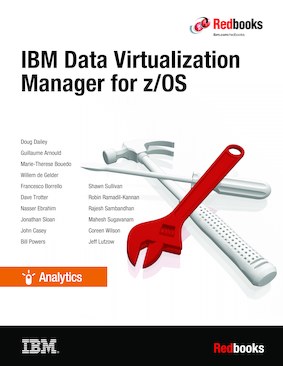
Published on 07 October 2021, updated 26 October 2021
Share this page:
ISBN-10: 0738459984
ISBN-13: 9780738459981
IBM Form #: SG24-8514-00
Authors: Doug Dailey, Guillaume Arnould, Marie-Therese Bouedo, Willem de Gelder, Francesco Borrello, Dave Trotter, Nasser Ebrahim, Jonathan Sloan, John Casey, Bill Powers, Shawn Sullivan, Robin Ramadil-Kannan, Rajesh Sambandhan, Mahesh Sugavanam, Coreen Wilson and Jeff Lutzow
Abstract
This IBM® Redbooks® publication presents an overview of the IBM Data Virtualization Manager for IBM z/OS® offering and the role it plays in accessing traditional non-relational data on IBM Z.
If there is anything true about the IT industry, it is change and data. Data Virtualization Manager for z/OS is built with both of these absolute truths in mind. With Data Virtualization Manager for z/OS, an organization can extend its infrastructure and data investments to support new ways of accessing and presenting data within modern applications. Modernizing access to those highly valuable traditional non-relational data sources is its reason for existence.
The book begins with general concepts, the value of virtualization to an organization, and the benefits of virtualizing data assets that originate on IBM Z®. It compares the benefits and implications of accessing data where it originates to the effect of moving that data to another platform for data access. Modernization is often at the center of any Data Virtualization project and Data Virtualization Manager for z/OS can play a key role in these efforts.
Next, the book describes the architecture of the Data Virtualization Manager for z/OS server and provides technical details of the data asset virtualization process so that technical users can better prepare for deployment of this new technology. The book provides a description of the server's most important components and functions so that a user can better understand how to take advantage of the extensive capabilities.
Beyond the fundamental description of the server components, the book documents how to install and configure the server, how to connect it to various data sources (such as VSAM and IMS), the different access methods for different types of data sources, and how to manage, monitor, and tune. A chapter about capacity planning and deployment also is included, along with best practices for project success. Lastly, some helpful appendixes are available, including one about troubleshooting and diagnostics.
Although this book does not include all the documentation that is relevant to Data Virtualization Manager for z/OS, we believe it to be a good roadmap to get you on your way to a successful virtualization project.
The introductory chapters of this publication are intended for a broad technical audience, including IT system architects, technical IT managers, operations managers, system programmers, application developers, and other technical roles. The subsequent chapters provide more technical details about the virtualization of specific types of data sets on IBM Z and might be more suitable to technicians who are implementing virtualization on those specific data assets.
Table of Contents
Chapter 1. Introduction
Chapter 2. Architecture and implementation
Chapter 3. Installation and configuration
Chapter 4. Connecting to z/OS data sources
Chapter 5. Connecting to non-Z data sources
Chapter 6. Access methods
Chapter 7. Managing and monitoring
Chapter 8. Performance tuning and query optimization
Chapter 9. Capacity planning and deployment
Chapter 10. Best practices for project success
Appendix A. Project survey
Appendix B. Java API sample code snippet
Appendix C. Troubleshooting and diagnosing